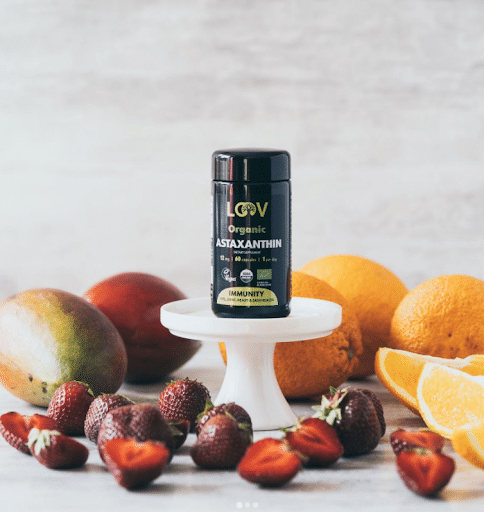Health starts in the kitchen is a familiar idea to natural-living enthusiasts. Your body needs assistance to stay healthy, happy and strong, defend against pathogens and keep you moving with ease. We’re here with a list of tasty foods to provide just that.
Table of Contents
1. Citrus Fruits
2. Raw Honey
3. Watermelon
4. Spinach
5. Berries
6. Almonds
7. Algae
8. Bell Peppers
9. Seeds
Eat Well to Live Well
We’ll discuss the perks of charging your meals with a serving of:
- Citrus fruits
- Raw honey
- Watermelons
- Spinach
- Berries
- Almonds
- Algae
- Bell peppers
- Seeds
Already consume these ingredients regularly? Nevertheless, it doesn’t hurt to emphasize them, especially if you notice yourself weakening with weariness, adverse weather, and the lack of natural sunlight.
Join us to explore these accessible superfoods. Use what Mother Earth gave you and take your health-boosting menu to the next level.
1. Citrus Fruits
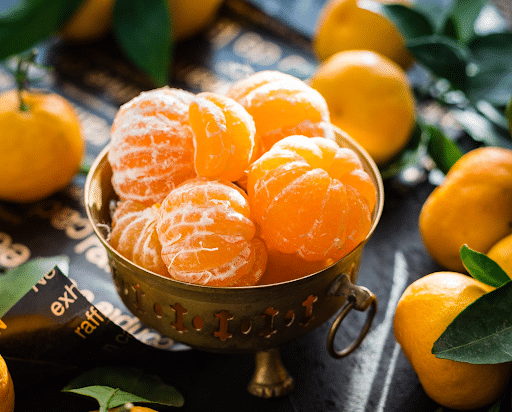
Citrus immunity shots are in high demand for a good reason. These refreshing fruits are health bombs, rife in nutrients that leave your immune system humming in delight.
All citrus fruits are rich in Vitamin C—so much so that one medium orange meets your full-day needs.
Vitamin C supports immunity, keeping you safe against pathogens. This nutrient also facilitates white blood cell production, helping you fend off illness if it does enter your body.
A common myth says that Vitamin C can prevent colds. While that’s not true, it shortens illness duration.
💡 Expert Tip:
Drip fresh lemon juice into your water bottle. This refreshing drink will supply your citrus requirements, one sip at a time.
2. Raw Honey
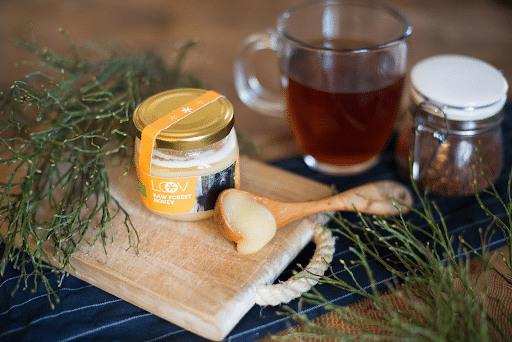
Raw honey was a famous folk remedy throughout history, and we’re not quick to shun the knowledge of our ancestors. This sweet substance offers a tremendous feel-good boost to the modern consumer.
All you need to do is ensure you’re buying an unpasteurised variety, as mass manufacturing processes destroy many essential nutrients.
Raw honey has several fantastic effects on your well-being.
- It’s viral pathogens-fighting and antiseptic.
- It’s rich in phytonutrients, highly antioxidant chemicals.
- It suppresses a cough and soothes a sore throat.
💡 Expert Tip:
Don’t like sugary drinks? Make a habit of having a spoonful of raw honey with your first glass of water. It’ll sweeten your mornings and set you up for a healthy day ahead.
3. Watermelon

People generally consider watermelon a rejuvenating summer snack, but it does much more than hydrate you on a sweltering day. This low-calorie fruit is full of antioxidants and essential micronutrients.
Notably, watermelon contains more lycopene than any other fruit or veggie. This powerful antioxidant protects your cells from oxidative damage, keeping them robust and efficient. It also deters nasty conditions caused by free radicals.
Another benefit stems from watermelon’s vitamin A and C contents. These nutrients support immune function, making your body more capable of warding off disease.
💡 Expert Tip:
Your local shop doesn’t store off-season fruit? Watermelon is super freezer-friendly. Slice it up and make refreshing smoothies all winter long.
4. Spinach
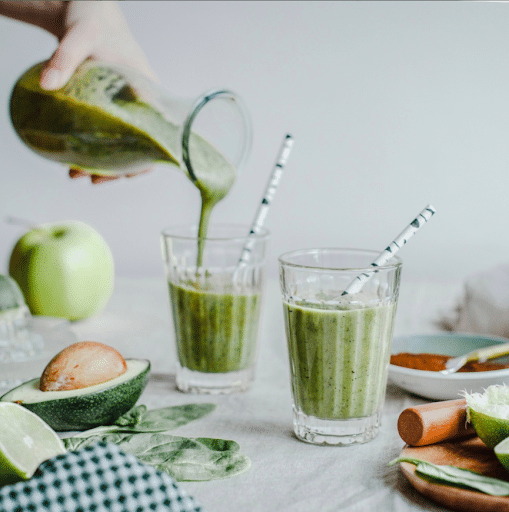
Spinach is a valuable Vitamin C source, but that’s not the only reason we’re discussing it. It’s packed with antioxidants and beta carotene, both of which strengthen our illness-fighting abilities.
What’s more, spinach contains phytonutrients, a compound that promotes immune function.
If you eat it raw, you top off your boost with a fair dose of potassium, crucial for proper cell functioning.
💡 Expert Tip:
Spinach is the healthiest when it’s as unprocessed as possible. Consider tossing a handful of leaves into your smoothie for bonus points.
5. Berries
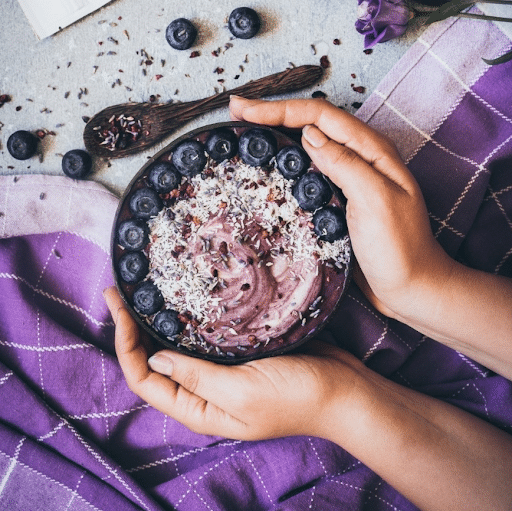
Berries are the shining example of why eating the rainbow is good for you.
These vibrant fruits contain polyphenol, a plant antioxidant that counters cell damage. This nutrient also reduces swelling and irritation and enhances the immune response, letting the body fend off disease and recover quicker.
Moreover, berries are packed with vitamins and good for your gut, enhancing your immune response from the get-go.
Here’s the micronutrient potency of berries, focusing on immunity-enhancing vitamins and minerals. If this doesn’t seem like much in the mineral department, remember that these contents come in 50 calories or less.
| Blueberries | Strawberries | Blackberries | |
| Vitamin C | 16% | 97% | 35% |
| Vitamin E | 5% | 1% | 7% |
| Magnesium | 1% | 3% | 5% |
| Zinc | 1% | 3% | 5% |
💡 Expert Tip:
If berries are out-of-season, pick up a frozen pack at your local grocery store. These cold goodies are as effective as the fresh version.
6. Almonds
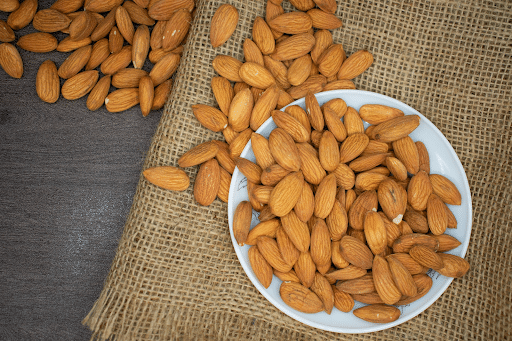
Almonds pack quite a nutritious punch, supplying the body with 15 micronutrients in one decadent package. They’re particularly rich in magnesium, iron and zinc, all of which regulate immune function.
Besides the mineral boost, almonds supply high amounts of vitamin E, which has antioxidant functions and supports lung health. It enhances immunity and offers greater protection against bacteria and pathogens.
💡 Expert Tip:
Find almonds too calorie-dense to include in your day-to-day life? Try almond milk. It’s much less fatty than its solid counterpart while still delivering impressive amounts of iron and vitamin E.
7. Algae
Interested in spicing up your diet with something different? Choose algae. Seaweed is super-nutritious and useful for your overall well-being. It’s been a staple in Asian cuisine for centuries, making its way to British kitchens in recent years.
Algae are rich in vitamins C, A and K, as well as calcium and potassium. These micronutrients are good news for your body’s illness safeguards.
Those following a plant-centered diet also benefit from the source of vitamin B12—rarely available in plant-centered foods but important for red blood cell production.
💡 Expert Tip:
Don’t miss out on algae if you dislike the taste. Go for a supplement, like our organic astaxanthin, to reap the same benefits in a smaller, more convenient package. This supplement is rich in vitamin C, encouraging a vigorous immune response.
“It does so much to help my skin, joints, heart, etc. and acts like an antioxidant and an energetic boost to the system.”
8. Bell Peppers
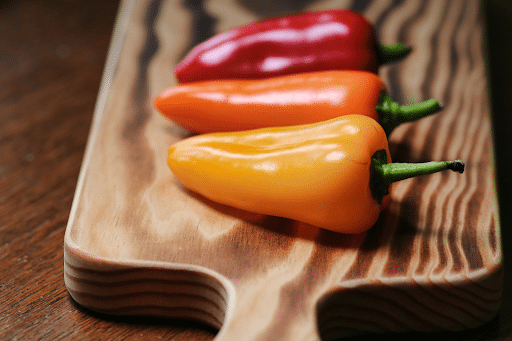
Bell peppers are a versatile cooking ingredient and Vitamin C powerhouses (one large veggie contains twice the amount of your usual orange). They also supply half of your daily vitamin A requirements.
These flavourful plants are abundant in macro and micronutrients while remaining low on calories. They promote gut health and supply a rich dose of minerals, including magnesium and potassium.
💡 Expert Tip:
If you can choose, go for red bell peppers. They’re the ripest version of the vegetable and, therefore, the most nutrient-rich of the bunch.
9. Seeds
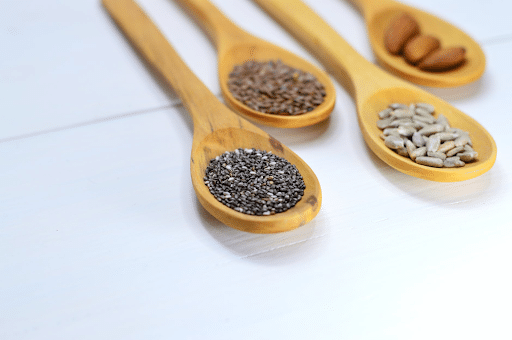
Sometimes, the best things do come in small packages, and that’s certainly true for seeds. These nutrient bombs provide a good supply of vitamins, minerals, fibre, protein and fat.
Take a look at the notable benefits of three seed types readily-available in Western kitchens.
| Chia | Flax | Sunflower |
| Anti-irritant | Anti-irritant | Antioxidant |
| Omega-3 fatty acids | Omega-3 and Omega-6 fatty acids | Good fat |
| Calcium | Vitamin B | Vitamin E |
| Magnesium | Cooper | Magnesium |
Besides vitamins and minerals we’ve already mastered, seeds supply your body with Omega-3 and Omega-6 fatty acids. These beneficial fats regulate immune functioning.
💡 Expert Tip:
Seeds fit various caloric needs and dietary preferences. Choose chia if you’re on a tight caloric budget. People aiming for surplus should go with sunflower seeds.
Eat Well to Live Well
A balanced diet will see you healthy, happy and safe through the winter. Why not give your immune cells a helping hand, though?
Our food list consists of tasty, accessible and wellness-boosting ingredients. You’ll only benefit from consuming more of them.
Not sure how to include everything in one day? The good news is that you don’t have to—a serving or two is already magic for your immunity.
If you’re feeling extra, here’s how we’d do it:
- Raw honey and lemon water first thing in the morning
- A bowl of almond-berry oatmeal for breakfast
- Stuffed bell peppers for lunch
- A smoothie with watermelon and spinach as a snack
- A seed-sprinkled seaweed salad for dinner (or a regular salad plus a supplement)
That sounds like one delectable day!
Eat these foods raw or cook wholesome meals and snacks. Munch on healthy delights and support your body from the inside out.
